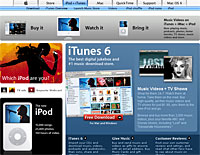 Apple’s iTunes online store has been ranked the seventh-largest music retailer in the US in the third quarter, charging into the top 10 for the first time.
Apple’s iTunes online store has been ranked the seventh-largest music retailer in the US in the third quarter, charging into the top 10 for the first time.
According to research from the NPD Group, iTunes Music Store has climbed from fourteenth place last year to overtake many US High Street music stores.
Based on the number of songs sold, Wal-Mart, Best Buy, Target and Amazon.com remained the top four, although iTunes rising star is expected to overtake more stores by the end of the year.
 Already eating iTunes’ dust are big names like Tower Records and Borders, reflecting music fans’ growing passion for online music.
Already eating iTunes’ dust are big names like Tower Records and Borders, reflecting music fans’ growing passion for online music.
“With the growing interest in digital music, forecasts of more iPod demand this holiday, plus the stocking-stuffer appeal of iTunes gift cards, we can expect Apple to increase its share even more by year’s end,” predicted Russ Crupnick, music and movies industry analyst for the NPD Group in the report.
Launched in April 2003 to offer downloadable tracks to users of its best-selling iPod digital music player, Apple has sold more than 600 million songs, with the service boasting more than 10 million iTunes account holders.
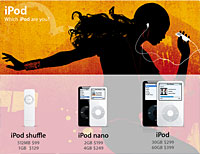 Combined revenue from the iPod, Apple’s fastest- selling product, and iTunes music accounted for a massive 40 percent of sales last quarter, up from 27 percent a year earlier.
Combined revenue from the iPod, Apple’s fastest- selling product, and iTunes music accounted for a massive 40 percent of sales last quarter, up from 27 percent a year earlier.
Steve Jobs has confirmed that Apple have already shifted over 30 million iPods since the product launched in 2001.
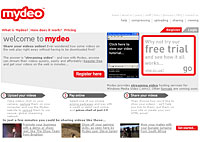 Mydeo, the UK consumer video streaming company, has teamed up with UK ISP Tiscali to offer streaming video sharing services to broadband users of the UK Tiscali Website.
Mydeo, the UK consumer video streaming company, has teamed up with UK ISP Tiscali to offer streaming video sharing services to broadband users of the UK Tiscali Website. Members will be able to stream their cinematic masterpieces on a pay-as-you-go basis, and will only have to shell out when they choose to upload a video. Users can pay in Euros, UK Pounds or US Dollars.
Members will be able to stream their cinematic masterpieces on a pay-as-you-go basis, and will only have to shell out when they choose to upload a video. Users can pay in Euros, UK Pounds or US Dollars.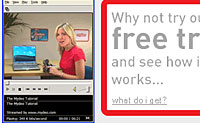 “Mydeo is really easy to use and offers lots of help and support for our members who may be putting video on the Web for the first time,” Hole insisted.
“Mydeo is really easy to use and offers lots of help and support for our members who may be putting video on the Web for the first time,” Hole insisted.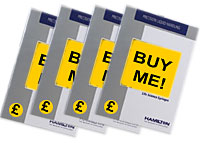 The Internet was supposed to herald in an age of paperless offices, online browsing and tree-untroubling electronic mail, but it seems that when it comes to flogging goods, the trusty old print catalogue still rules the roost.
The Internet was supposed to herald in an age of paperless offices, online browsing and tree-untroubling electronic mail, but it seems that when it comes to flogging goods, the trusty old print catalogue still rules the roost. The survey found that old fashioned catalogues remain one of the most effective promotional channels for generating online orders, with 60% of survey respondents currently licking stamps on catalogues and brochures to be sent to customers in an attempt to increase online sales.
The survey found that old fashioned catalogues remain one of the most effective promotional channels for generating online orders, with 60% of survey respondents currently licking stamps on catalogues and brochures to be sent to customers in an attempt to increase online sales. Additionally, the survey revealed that 55% of retailers planned to follow the annoying trend set by High Street stores and “extend” the Christmas buying period by encouraging consumers to buy earlier (If only we could “extend” the Christmas holiday period too).
Additionally, the survey revealed that 55% of retailers planned to follow the annoying trend set by High Street stores and “extend” the Christmas buying period by encouraging consumers to buy earlier (If only we could “extend” the Christmas holiday period too). Around 80% of consumers are expected to buy at least a quarter of their Christmas purchases online this year – up a mighty 15% over last year.
Around 80% of consumers are expected to buy at least a quarter of their Christmas purchases online this year – up a mighty 15% over last year. Convergence took a step forward Friday past as Cisco announced the takeover of Scientific Atlanta (SA). The price? $6.9 billion cash.
Convergence took a step forward Friday past as Cisco announced the takeover of Scientific Atlanta (SA). The price? $6.9 billion cash. The acquisition looks a good fit though, Cisco are keen to push their IPTV proposition, SA’s strength in the US set-top-box market (they have around 40% market share) will allow them to capitalise on the access to the home that video brings. The companies’ combined news release majors on this, John Chambers, president and chief executive officer of Cisco Systems said “Video is emerging as the key strategic application in the service provider triple play bundle of consumer entertainment, communication and online services.”
The acquisition looks a good fit though, Cisco are keen to push their IPTV proposition, SA’s strength in the US set-top-box market (they have around 40% market share) will allow them to capitalise on the access to the home that video brings. The companies’ combined news release majors on this, John Chambers, president and chief executive officer of Cisco Systems said “Video is emerging as the key strategic application in the service provider triple play bundle of consumer entertainment, communication and online services.” Formed in 1951, SA has long been a market leader in Cable TV, has a healthy balance sheet and already has one large IPTV customer in the shape of SBC Communications. The critical mass of SA as part of Cisco should help it win more.
Formed in 1951, SA has long been a market leader in Cable TV, has a healthy balance sheet and already has one large IPTV customer in the shape of SBC Communications. The critical mass of SA as part of Cisco should help it win more.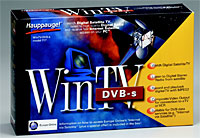 Hauppauge Digital have whipped out a new add-on card to convert a boring old PC into a multimedia-tastic satellite TV receiver.
Hauppauge Digital have whipped out a new add-on card to convert a boring old PC into a multimedia-tastic satellite TV receiver. Freesat will be the satellite equivalent of Freeview,” said Yehia Oweiss, Managing Director of Hauppauge Digital. “Already broadcasting BBC, the service will be available to all UK households and bring free digital TV to the 25 per cent who are outside Freeview’s area. Consumers can buy our Freesat tuner now and enjoy many digital channels now, with more being added all the time.”
Freesat will be the satellite equivalent of Freeview,” said Yehia Oweiss, Managing Director of Hauppauge Digital. “Already broadcasting BBC, the service will be available to all UK households and bring free digital TV to the 25 per cent who are outside Freeview’s area. Consumers can buy our Freesat tuner now and enjoy many digital channels now, with more being added all the time.” Ofcom estimates that the digital switchover programme will release up to 112 MHz of spectrum in the UHF (Ultra High Frequency) band for new uses. The UHF band is prime spectrum, because it offers a technically valuable combination of capacity (bandwidth) and range.
Ofcom estimates that the digital switchover programme will release up to 112 MHz of spectrum in the UHF (Ultra High Frequency) band for new uses. The UHF band is prime spectrum, because it offers a technically valuable combination of capacity (bandwidth) and range.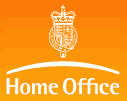 It also provides practical guidance on how to use search effectively but safely, for example, by monitoring or filtering your search results.
It also provides practical guidance on how to use search effectively but safely, for example, by monitoring or filtering your search results. Submissions should give the name and postal address of the person sending the memorandum and should state whether it has been prepared specifically for the Committee. If the memorandum is from an organisation rather than an individual, it should briefly explain the nature and membership of the organisation. The Committee may publish some of the submissions it receives.
Submissions should give the name and postal address of the person sending the memorandum and should state whether it has been prepared specifically for the Committee. If the memorandum is from an organisation rather than an individual, it should briefly explain the nature and membership of the organisation. The Committee may publish some of the submissions it receives. The rollout of ADSL2+ in the UK appears to be going through a reverse-hype process, with people saying it’s not going to deliver high speeds to most people. That may be partially true, but in urban areas where people are within 1.5Km of the exchange they should get 20Mb/s+.
The rollout of ADSL2+ in the UK appears to be going through a reverse-hype process, with people saying it’s not going to deliver high speeds to most people. That may be partially true, but in urban areas where people are within 1.5Km of the exchange they should get 20Mb/s+. 3. The significance (or lack thereof) of these reports should be plainly stated. Similarly, if Ofcom is not necessarily endorsing a particular report’s conclusions, it should plainly state that fact. An ‘evidence-based’ regulator should be very clear as to how it treats these findings made by third parties. If the Scientific Generics report is not endorsed by the Ofcom Board, but it is merely one of many research inputs on the issue of digital switchover costs, then Walls’ claims are clearly overstated. However, it’s hard to blame the press when reports like these are published on the Ofcom website with no disclaimers, giving them the imprimatur of Ofcom approval.
3. The significance (or lack thereof) of these reports should be plainly stated. Similarly, if Ofcom is not necessarily endorsing a particular report’s conclusions, it should plainly state that fact. An ‘evidence-based’ regulator should be very clear as to how it treats these findings made by third parties. If the Scientific Generics report is not endorsed by the Ofcom Board, but it is merely one of many research inputs on the issue of digital switchover costs, then Walls’ claims are clearly overstated. However, it’s hard to blame the press when reports like these are published on the Ofcom website with no disclaimers, giving them the imprimatur of Ofcom approval.